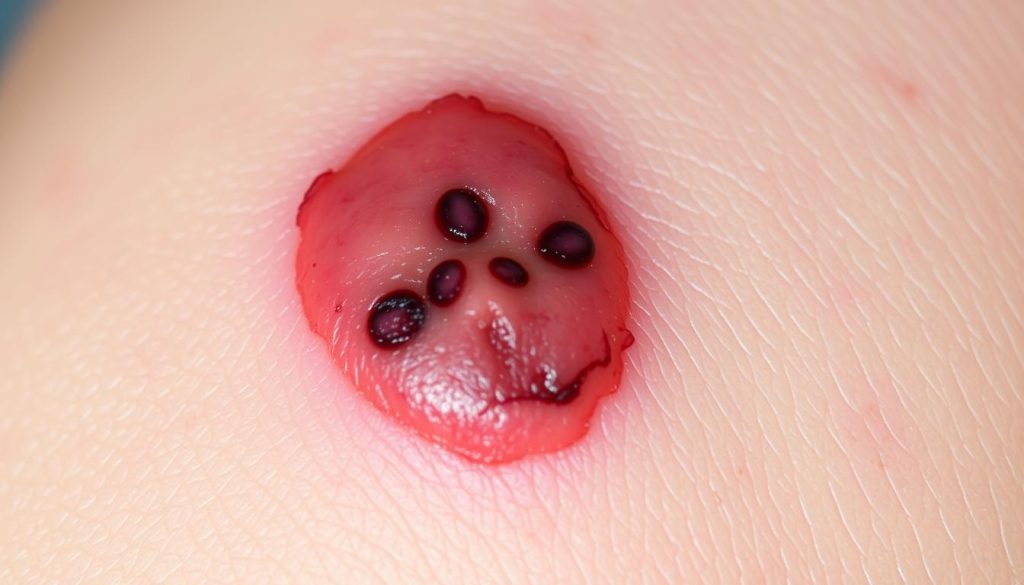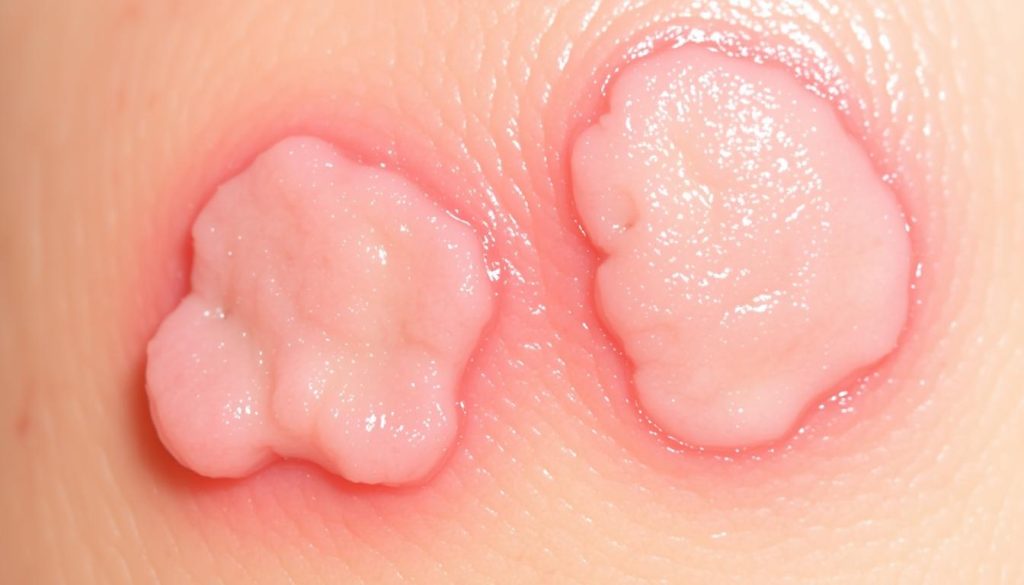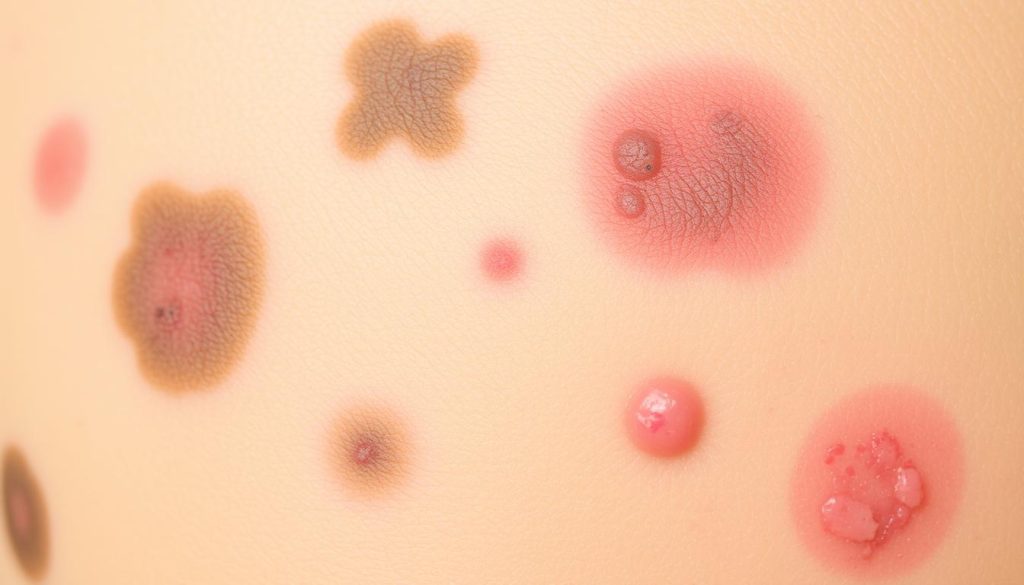Skin cancer is a big worry in the United States. Knowing about the different types can help catch it early. This guide will look at melanoma, basal cell carcinoma, and squamous cell carcinoma. Each type of skin cancer has its own traits and risks. Melanoma is the most serious but rare. Basal cell carcinoma is the most common, with squamous cell carcinoma coming second. Learning about these types helps you spot signs early and prevent them.
Let’s dive into the main features of these cancers, their symptoms, and why catching them early is key. Remember, knowing about skin cancer helps protect your health.
Understanding Common Skin Cancer Types
Skin cancer is a big worry for many, with different types affecting millions. Knowing the types is key for catching it early and treating it right.
Major Skin Cancer Classifications
The main types are melanoma, basal cell carcinoma, and squamous cell carcinoma. Each has its own traits and seriousness levels.
| Cancer Type | Description | Severity |
|---|---|---|
| Melanoma | Develops in melanocytes | Most aggressive |
| Basal Cell Carcinoma | Starts in basal cells | Least aggressive |
| Squamous Cell Carcinoma | Occurs in squamous cells | Moderately aggressive |
Risk Factors and Prevalence
UV radiation is the main risk for all types of skin cancer. Other risks include fair skin, family history, and weak immune systems. In the U.S., skin cancer is the top cancer, with over 5 million cases each year.
Skin Cancer Development
Skin cancer starts when DNA damage in skin cells causes mutations. These mutations make cells grow fast and out of control, forming tumors. UV radiation from the sun or tanning beds is the main cause of this damage. So, protecting your skin from the sun is key to preventing skin cancer.
Melanoma: The Most Aggressive Form
Melanoma is the most dangerous skin cancer. It starts in cells that make melanin, the skin’s pigment. Finding it early is key to treating it well and living longer.

Signs and Symptoms of Melanoma
Spotting melanoma early can save lives. Look for changes in moles or new skin spots. Moles that grow, change shape, or color are signs to see a doctor right away.
ABCDE Rule for Melanoma Detection
The ABCDE rule helps spot melanomas:
- Asymmetry: One half doesn’t match the other
- Border: Irregular, ragged, or blurred edges
- Color: Varied shades within a single mole
- Diameter: Larger than 6mm (about the size of a pencil eraser)
- Evolving: Changes in size, shape, or color over time
Stages of Melanoma Development
Melanoma goes through stages, from early to advanced. Regular skin checks and quick doctor visits are vital. They help catch melanoma early, when it’s easier to treat.
| Stage | Description | 5-Year Survival Rate |
|---|---|---|
| 0 | In situ (confined to epidermis) | 99% |
| I | Localized, thin | 92-97% |
| II | Localized, thicker | 53-81% |
| III | Regional spread | 40-78% |
| IV | Distant metastasis | 15-20% |
Basal Cell Carcinoma: Most Common Type
Basal cell carcinoma is the most common skin cancer. It starts in the basal cells, the deepest layer of the skin. Sun exposure is a big factor in its development, so it’s important to know about it.
Basal cell carcinoma looks like small, flesh-colored or pearl-like bumps. These bumps often show up on sun-exposed areas like the face, ears, neck, and hands. Even though they grow slowly, they can cause serious damage if not treated.
Risk factors for basal cell carcinoma include:
- Prolonged sun exposure
- Fair skin
- Age (more common in older adults)
- Personal history of skin cancer
- Immunosuppressive medications
Early detection is key to treating basal cell carcinoma well. Regular skin checks and quick action on any unusual changes can greatly improve outcomes. Though rarely deadly, it can cause disfigurement if not treated.
| Characteristic | Description |
|---|---|
| Appearance | Small, shiny bumps or scaly patches |
| Color | Flesh-colored, white, brown, or pink |
| Texture | Waxy or pearly |
| Growth | Slow, but can become invasive |
| Common Locations | Face, ears, neck, scalp, shoulders |
Prevention is the best way to fight basal cell carcinoma. Reduce sun exposure, use broad-spectrum sunscreen, wear protective clothes, and avoid tanning beds. These steps can lower your risk of getting this common skin cancer.
Squamous Cell Carcinoma: Signs and Symptoms
Squamous cell carcinoma (SCC) is a common skin cancer. It starts in the squamous cells, which are flat cells in the outer skin layer.

Identifying Early Warning Signs
It’s important to spot SCC early. Look out for these signs:
- Scaly red patches
- Open sores that don’t heal
- Raised growths with a depression in the center
- Wart-like growths
Common Areas of Development
SCC often shows up in areas that get a lot of sun. The most common places are:
- Face, ears, and lips
- Neck and scalp
- Arms and hands
- Legs and feet
Risk Factors for SCC
Knowing the risk factors helps prevent and catch SCC early:
| Risk Factor | Description |
|---|---|
| UV Radiation Exposure | Sun exposure and tanning bed use increase risk |
| Fair Skin | Less melanin means less protection from UV rays |
| Age | Risk increases with age due to cumulative sun exposure |
| Weakened Immune System | Compromised immunity increases vulnerability to skin cancers |
Regular skin checks and avoiding UV radiation are key. If you see any suspicious spots, see a dermatologist right away.
Early Detection and Prevention Strategies
Catching skin cancer early can save lives. Regular self-checks and professional screenings are key. Look for new moles or growths, and watch for changes in existing ones. If you notice anything unusual, don’t wait – see a dermatologist right away.
Prevention is just as important as early detection. Limiting sun exposure is key. Wear protective clothing, seek shade during peak UV hours, and apply broad-spectrum sunscreen daily. Remember, UV radiation can damage your skin even on cloudy days.
Here are some essential prevention tips:
- Use sunscreen with SPF 30 or higher
- Wear wide-brimmed hats and sunglasses
- Avoid tanning beds
- Check your skin monthly
- Get yearly skin exams from a professional
By making these habits part of your routine, you can significantly reduce your risk of skin cancer. Stay informed about the different skin cancer types and take action to protect yourself. Your skin will thank you for years to come.
The Role of UV Radiation in Skin Cancer Development
UV radiation is key in skin cancer development. Sun exposure, the main source of UV radiation, harms skin cells and raises cancer risk. Knowing how to protect against UV rays is essential to fight skin cancer.
UVA vs UVB Radiation Effects
UVA and UVB rays impact the skin in different ways. UVA goes deep, leading to early aging and DNA damage. UVB hits the outer layers, causing sunburns and direct DNA damage. Both increase the risk of skin cancer.
| UV Type | Penetration | Effects |
|---|---|---|
| UVA | Deep | Aging, indirect DNA damage |
| UVB | Superficial | Sunburns, direct DNA damage |
Sun Protection Methods
Protecting your skin from the sun is critical. Use sunscreen with SPF 30 or higher, wear protective clothes, and stay in the shade when UV is strong. Regular skin checks can catch cancer early.

Artificial UV Exposure Risks
Tanning beds are dangerous for your skin. They give off intense UV radiation, stronger than the sun. Using tanning beds often raises the risk of melanoma and other cancers. Stay away from tanning beds to keep your skin safe.
Rare Forms of Skin Cancer
Most people know about common skin cancers. But, some rare types are often missed. These unusual cancers need special care because of their unique traits and treatment needs.
Merkel cell carcinoma is a rare and aggressive skin cancer. It looks like a flesh-colored or bluish-red nodule. It often shows up on sun-exposed areas like the face, neck, and arms. This cancer grows fast and can spread quickly to other parts of the body.
Actinic keratosis is another rare condition. It’s not cancer itself but can turn into skin cancer if not treated. These rough, scaly patches usually appear on sun-exposed areas like the face, ears, and hands.
Other rare skin cancers include:
- Cutaneous T-cell lymphoma
- Kaposi’s sarcoma
- Sebaceous carcinoma
Early detection is key for these rare cancers. Regular skin checks and quick medical attention for any unusual changes can greatly improve treatment outcomes. If you see any suspicious growths or changes in your skin, see a dermatologist right away.
Identifying Suspicious Skin Lesions
It’s key to spot unusual skin lesions early for skin cancer detection. Most moles are safe, but knowing the difference is vital.
Normal vs. Abnormal Moles
Normal moles are round or oval, smooth, and one color. They’re usually under 6mm. But, abnormal moles might show danger signs.
- Asymmetry
- Irregular borders
- Varied colors within the same mole
- Diameter larger than 6mm
- Evolution or changes over time

Watch for new moles or changes in old ones. Check your skin regularly to catch issues early.
When to See a Dermatologist
See a dermatologist if you notice these signs:
- A mole that itches, bleeds, or becomes painful
- Rapid growth or changes in size, shape, or color
- New moles appearing after age 30
- Any skin lesion that doesn’t heal within a few weeks
Early skin cancer detection, like melanoma, leads to better treatment. If you’re worried about skin changes, get professional help.
Treatment Options for Different Skin Cancer Types
Skin cancer treatment varies based on the type, size, and stage of the cancer. Doctors create personalized plans for each patient. Let’s look at common treatments for different skin cancers.
Melanoma often starts with surgery. Doctors remove the tumor and some surrounding tissue. For more advanced cases, they might use immunotherapy or targeted therapy. These treatments help the body fight cancer cells better.
Basal cell carcinoma and squamous cell carcinoma have similar treatments. Surgery is a common choice. For small tumors, cryosurgery – freezing the cancer cells – might be used. Larger tumors may need Mohs surgery, where layers are removed until no cancer cells are left.
| Skin Cancer Type | Common Treatments |
|---|---|
| Melanoma | Surgery, Immunotherapy, Targeted Therapy |
| Basal Cell Carcinoma | Surgery, Cryosurgery, Mohs Surgery |
| Squamous Cell Carcinoma | Surgery, Cryosurgery, Radiation Therapy |
Radiation therapy is another option for skin cancer treatment. It’s used when surgery isn’t possible. Some patients might benefit from topical treatments or photodynamic therapy. These methods use special creams or light-sensitive drugs to kill cancer cells.
Early detection is critical in treating all skin cancers. Regular skin checks and quick medical attention can greatly improve treatment outcomes.
Living with Skin Cancer: Management and Care
Getting a skin cancer diagnosis can be tough. But, with the right care, many people live well. Adjusting to life after diagnosis means making lifestyle changes and finding support.
Lifestyle Adjustments
Living with skin cancer means being careful about the sun. Patients need to follow strict sun protection rules. This includes:
- Wearing broad-spectrum sunscreen daily
- Covering up with protective clothing
- Avoiding peak sun hours
- Regular skin self-exams

Support Systems and Resources
A strong support network is key for skin cancer patients. They can find help and advice from:
- Support groups for skin cancer
- Online forums for sharing
- Educational resources from cancer groups
- Counseling for emotional support
These resources offer important info, coping tips, and connections with others facing the same challenges.
By making lifestyle changes and using available support, people with skin cancer can face their diagnosis with confidence and hope.
Genetic Factors and Family History
Genetics are key in our risk for skin cancer. Knowing your family history can give you clues about your risk for melanoma and other skin cancers.
Your DNA holds secrets about your skin’s defense against UV rays. If your relatives had skin cancer, you might have genes that raise your risk. It doesn’t mean you’ll get skin cancer, but you should watch out more.
Some genetic factors that raise skin cancer risk include:
- Fair skin that burns easily
- Light-colored eyes
- Blonde or red hair
- Certain inherited conditions like xeroderma pigmentosum
It’s important to know your family’s health history. If many family members had melanoma or skin cancers, think about genetic testing. This can spot specific gene mutations that up your risk. Hugh Jackman’s story with skin cancer shows the need for regular check-ups, even with a family history.
Having genetic risk factors doesn’t mean you’ll get skin cancer. It just means you should protect your skin more and get regular checks. Early detection and prevention are vital for managing skin cancer.
Latest Advances in Skin Cancer Research
Exciting breakthroughs in skin cancer research are paving the way for better treatments and prevention methods. Scientists are making strides in understanding the various skin cancer types, including melanoma, basal cell carcinoma, and squamous cell carcinoma.
Emerging Treatment Options
New therapies for skin cancer are showing promise. Immunotherapy, which boosts the body’s own defenses, is proving effective against aggressive melanomas. Targeted drugs that attack specific genetic mutations in cancer cells are also yielding positive results for different skin cancer types.
Breakthrough Studies
Recent studies have shed light on the genetic factors behind skin cancer development. Researchers have identified key genes linked to melanoma risk, opening doors for early detection and personalized treatments. These findings could reshape how we approach skin cancer prevention and care.
Future Prevention Methods
Scientists are exploring innovative ways to protect skin from harmful UV rays. Advanced sunscreens that repair DNA damage and wearable UV sensors are in development. These tools aim to reduce the risk of all skin cancer types, from common basal cell carcinomas to more serious melanomas.
FAQ
Q: What are the main types of skin cancer?
A: There are three main types of skin cancer. Melanoma is the most aggressive. Basal cell carcinoma is the most common. Each type needs a different treatment.
Q: How can I identify signs of skin cancer?
A: Look for changes in your skin, like in moles or new growths. Use the ABCDE rule for melanoma: Asymmetry, Border irregularity, Color changes, Diameter larger than 6mm, and Evolution or changes over time. For other types, watch for persistent sores, reddish patches, or shiny bumps that don’t heal.
Q: What are the risk factors for developing skin cancer?
A: Risk factors include too much sun exposure and sunburns. Tanning beds, fair skin, and family history also increase risk. A weakened immune system and certain genetic conditions are other factors.
Q: How does UV radiation contribute to skin cancer?
A: UV radiation damages DNA in skin cells. This damage can lead to mutations that cause cells to grow uncontrollably. Both UVA and UVB rays contribute to skin cancer, though in different ways.
Q: What is the difference between UVA and UVB radiation?
A: UVA rays penetrate deeper into the skin and cause premature aging. UVB rays mainly affect the skin’s surface and cause sunburns. Both types increase skin cancer risk, making broad-spectrum sun protection key.
Q: How can I protect myself from skin cancer?
A: Use broad-spectrum sunscreen (SPF 30+), wear protective clothing, and seek shade during peak sun hours. Avoid tanning beds. Do regular skin self-exams and see a dermatologist annually, if at higher risk.
Q: Can skin cancer be cured if caught early?
A: Yes, many skin cancers are treatable if caught early. Basal cell and squamous cell carcinomas have high cure rates. Even melanoma can often be cured if caught early.
Q: What are some less common types of skin cancer?
A: Less common types include Merkel cell carcinoma and actinic keratosis. Other rare forms include Kaposi sarcoma, cutaneous T-cell lymphoma, and sebaceous gland carcinoma.
Q: How often should I have my skin checked by a professional?
A: Get a full-body skin exam by a dermatologist annually. If you have a history of skin cancer or other high-risk factors, your doctor may suggest more frequent check-ups.
Q: Are there any new treatments for skin cancer?
A: Yes, new treatments include targeted therapies and immunotherapies. These improve outcomes, even for advanced cases, like melanoma.

















